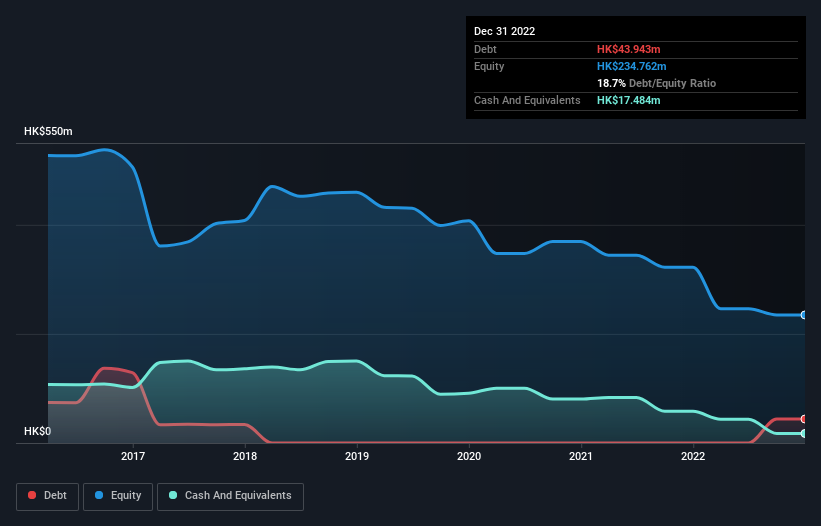
Legendary fund manager Li Lu (who Charlie Munger backed) once said, 'The biggest investment risk is not the volatility of prices, but whether you will suffer a permanent loss of capital.' So it seems the smart money knows that debt - which is usually involved in bankruptcies - is a very important factor, when you assess how risky a company is. We note that Kingbo Strike Limited (HKG:1421) does have debt on its balance sheet. But the more important question is: how much risk is that debt creating?
When Is Debt Dangerous?
Debt is a tool to help businesses grow, but if a business is incapable of paying off its lenders, then it exists at their mercy. Part and parcel of capitalism is the process of 'creative destruction' where failed businesses are mercilessly liquidated by their bankers. However, a more frequent (but still costly) occurrence is where a company must issue shares at bargain-basement prices, permanently diluting shareholders, just to shore up its balance sheet. Of course, debt can be an important tool in businesses, particularly capital heavy businesses. The first thing to do when considering how much debt a business uses is to look at its cash and debt together.
See our latest analysis for Kingbo Strike
What Is Kingbo Strike's Net Debt?
The image below, which you can click on for greater detail, shows that at December 2022 Kingbo Strike had debt of HK$43.9m, up from none in one year. On the flip side, it has HK$17.5m in cash leading to net debt of about HK$26.5m.

How Healthy Is Kingbo Strike's Balance Sheet?
We can see from the most recent balance sheet that Kingbo Strike had liabilities of HK$130.7m falling due within a year, and liabilities of HK$801.0k due beyond that. Offsetting these obligations, it had cash of HK$17.5m as well as receivables valued at HK$171.3m due within 12 months. So it can boast HK$57.3m more liquid assets than total liabilities.
This surplus strongly suggests that Kingbo Strike has a rock-solid balance sheet (and the debt is of no concern whatsoever). Having regard to this fact, we think its balance sheet is as strong as an ox. When analysing debt levels, the balance sheet is the obvious place to start. But it is Kingbo Strike's earnings that will influence how the balance sheet holds up in the future. So when considering debt, it's definitely worth looking at the earnings trend. Click here for an interactive snapshot.
In the last year Kingbo Strike had a loss before interest and tax, and actually shrunk its revenue by 70%, to HK$114m. To be frank that doesn't bode well.
Caveat Emptor
Not only did Kingbo Strike's revenue slip over the last twelve months, but it also produced negative earnings before interest and tax (EBIT). Its EBIT loss was a whopping HK$34m. Having said that, the balance sheet has plenty of liquid assets for now. That will give the company some time and space to grow and develop its business as need be. The company is risky because it will grow into the future to get to profitability and free cash flow. The balance sheet is clearly the area to focus on when you are analysing debt. But ultimately, every company can contain risks that exist outside of the balance sheet. These risks can be hard to spot. Every company has them, and we've spotted 2 warning signs for Kingbo Strike you should know about.
Of course, if you're the type of investor who prefers buying stocks without the burden of debt, then don't hesitate to discover our exclusive list of net cash growth stocks, today.
New: Manage All Your Stock Portfolios in One Place
We've created the ultimate portfolio companion for stock investors, and it's free.
• Connect an unlimited number of Portfolios and see your total in one currency
• Be alerted to new Warning Signs or Risks via email or mobile
• Track the Fair Value of your stocks
Have feedback on this article? Concerned about the content? Get in touch with us directly. Alternatively, email editorial-team (at) simplywallst.com.
This article by Simply Wall St is general in nature. We provide commentary based on historical data and analyst forecasts only using an unbiased methodology and our articles are not intended to be financial advice. It does not constitute a recommendation to buy or sell any stock, and does not take account of your objectives, or your financial situation. We aim to bring you long-term focused analysis driven by fundamental data. Note that our analysis may not factor in the latest price-sensitive company announcements or qualitative material. Simply Wall St has no position in any stocks mentioned.
About SEHK:1421
Prosperity Group International
An investment holding company, engages in the supply and installation of solar photovoltaic parts and equipment in the People's Republic of China.
Excellent balance sheet low.
Similar Companies
Market Insights
Community Narratives




